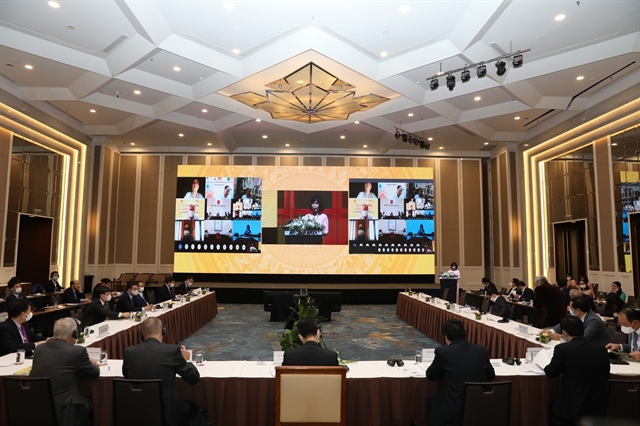 Economy
Economy


|
| Speakers at the conference discuss finance strategy for the 2021-30 period and solutions for economic recovery and development in Việt Nam. VNA/VNS Photo |
Anh Phạm
HÀ NỘI — Việt Nam's top priority for 2021-30 is to build a solid financial foundation for the country's sustainable development, said policymakers and experts during a conference held on Tuesday to discuss finance strategy for the 2021-30 period and solutions for economic recovery and development in Việt Nam.
Speaking at the conference, Deputy Minister of Finance Võ Thành Hưng stressed the importance of conducting further studies for financial and budget solutions to speed up the country's economic recovery and to achieve macroeconomic stability.
Hưng said the State budget's ability to weather the storm during the last two pandemic years has been a result of a long and difficult road, which started ten years ago with the approval of Việt Nam's Finance Strategy until 2020 by the Prime Minister's Office.
During 2016-20, Việt Nam's development investment was on average 33.7 per cent of annual GDP and slightly higher than the 2011-15 period at 31.7 per cent. The country's tax policy has been constantly put under review and pushed to modernise and improve. In 2011-20, State budget collection increased by 380 per cent compared to the 2001-10 period. Of which, the domestic source has been steadily increasing from an average of 68.7 per cent during the 2011-15 period to 82 per cent during 2016-20, and reached 85.6 per cent in 2020.
Pandemic budget
However, as the economy took a hit during the pandemic, budget collection has plummeted, especially after the government approved a number of support and rescue packages, mainly consisting of tax and fee reductions, to aid the business community.
Việt Nam's fiscal policy has faced numerous challenges due to massive expenses incurred to check the spread of the virus and to secure medical equipment and vaccines. This has forced the government to come up with a comprehensive financial strategy to spearhead economic recovery in the near future.
Nguyễn Như Quỳnh, deputy head of the National Institute for Finance under the Ministry of Finance, said a sound financial strategy is required at the core of the country's effort to liberate, mobilise and utilise all available financial resources for the development of science and technology, the digitalisation process and the realisation of other socio-economic development targets in the next ten years.
Quỳnh urged the government to quickly move to standardise and boost the efficiency of budget collection, to improve the business environment and encourage investment from the private sector. Meanwhile, Việt Nam must maintain strong fiscal discipline, especially in limiting budget deficit, national debt and in building up the financial system's resilience.
Prof. Trần Ngọc Anh, a member of the Prime Minister's Economic Council, said countries spend on average 1 per cent of GDP on disease prevention while Việt Nam's spending remained around 0.3-0.4 per cent. The pandemic has served as an example of why the country must allocate more resources in the production and procurement of medical supplies, medicine and vaccines.
Reforms
"Việt Nam must carry out strong financial reforms and establish a policy framework to guide all stakeholders' actions in a prudent and efficient manner," deputy chair of the National Financial Supervisory Commission Vũ Nhữ Thăng told the Viet Nam News Agency.
Special attention must be paid to the development of the banking sector to ensure fair competition, stability and capital market growth. In addition, the country must continue to push to modernise its financial infrastructure by taking full advantage of the latest technologies and information channels in order to deliver better financial services at lower costs to customers.
Economist Vũ Thành Tự Anh said policymakers should learn from efforts by other countries to centralise their finance. Anh said there were still shortcomings and limitations, especially on local government level financial systems who often fail to collaborate and combine financial resources for greater returns.
Earlier this month, economists called for greater efforts by the government to focus on domestic finance to produce greater growth during the Viet Nam Economic Pulse (VEP) - a semi-annual forum analysing trends and exploring emerging issues in economics and policymaking.
"Countries pursuing a strategy of export-led growth record trade surpluses and thus are net capital exporters in some form. On average, they invest a larger share of national income than capital importing countries," said Jonathan Pincus, senior economist from the United Nations Development Programme (UNDP).
He said the objectives of development finance policy are clear: Increasing access to long-term finance for infrastructure, industry and other classes of borrowers including small and medium-sized businesses; maintaining macroeconomic stability by reducing the procyclicality of finance; discouraging investment in unproductive, speculative activities; and reducing the probability and severity of the financial crisis.
"Việt Nam’s economic recovery from the COVID-19 pandemic and prospects for realising national development goals and the SDGs will to a significant extent be determined by the country’s ability to formulate a coherent and workable development finance strategy, to create new institutions capable of generating stable, long-term finance and to reform existing institutions," said Pincus.
By the end of 2020, the amount of taxes and fees waived for businesses hard hit by the pandemic reached VNĐ129 trillion (US$5.7 billion). In the Ministry of Finance's recent projection, the amount waived this year will reach over VNĐ140 trillion. In addition, additional funds must be secured in response to a volatile global economy in recovery and prolonged adverse effects caused by the virus in many years to come. — VNS




